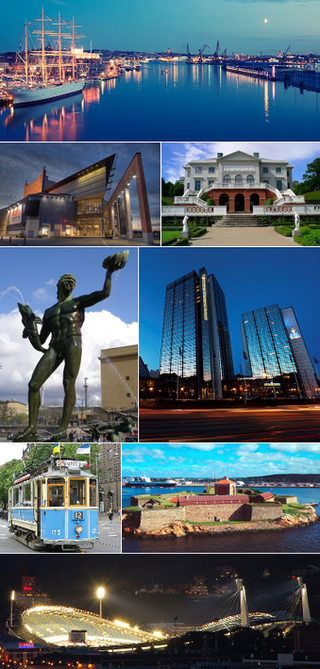
Gothenburg is the second-largest city in Sweden, after capital Stockholm, fifth-largest in the Nordic countries, and capital of the Västra Götaland County. It is situated by the Kattegat, on the west coast of Sweden, and has a population of approximately 600,000 in the city proper and about 1.1 million inhabitants in the metropolitan area.

The krona is the official currency of the Kingdom of Sweden. Both the ISO code "SEK" and currency sign "kr" are in common use; the former precedes or follows the value, the latter usually follows it but, especially in the past, it sometimes preceded the value. In English, the currency is sometimes referred to as the Swedish crown, as krona means "crown" in Swedish. The Swedish krona was the ninth-most traded currency in the world by value in April 2016.
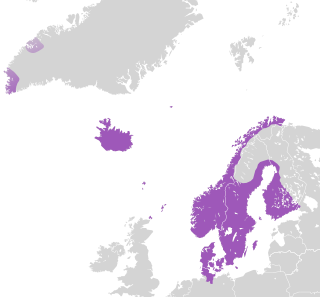
The Kalmar Union was a personal union in Scandinavia, agreed at Kalmar in Sweden, that from 1397 to 1523 joined under a single monarch the three kingdoms of Denmark, Sweden, and Norway, together with Norway's overseas colonies.

Malmö is the largest city in the Swedish county of Scania (Skåne). It is the third-largest city in Sweden, after Stockholm and Gothenburg, and the sixth-largest city in the Nordic region, with a municipal population of 357,377 in 2022. The Malmö Metropolitan Region is home to over 700,000 people, and the Øresund Region, which includes Malmö and Copenhagen, is home to 4 million people.

Swedish is a North Germanic language spoken predominantly in Sweden and in parts of Finland. It has at least 10 million native speakers, the fourth most spoken Germanic language and the first among any other of its type in the Nordic countries overall.

Scandinavia is a subregion in Northern Europe, with strong historical, cultural, and linguistic ties between its constituent peoples. Scandinavia most commonly refers to Denmark, Norway, and Sweden. In English usage, it can sometimes also refer more narrowly to the Scandinavian Peninsula, or more broadly to all of the Nordic countries, also including Finland, Iceland, and the Faroe Islands.

The Great Northern War (1700–1721) was a conflict in which a coalition led by the Tsardom of Russia successfully contested the supremacy of the Swedish Empire in Northern, Central and Eastern Europe. The initial leaders of the anti-Swedish alliance were Peter I of Russia, Frederick IV of Denmark–Norway and Augustus II the Strong of Saxony–Poland–Lithuania. Frederick IV and Augustus II were defeated by Sweden, under Charles XII, and forced out of the alliance in 1700 and 1706 respectively, but rejoined it in 1709 after the defeat of Charles XII at the Battle of Poltava. George I of Great Britain and the Electorate of Hanover joined the coalition in 1714 for Hanover and in 1717 for Britain, and Frederick William I of Brandenburg-Prussia joined it in 1715.

Carl XVI Gustaf is King of Sweden. He ascended the throne on the death of his grandfather, Gustaf VI Adolf, on 15 September 1973.

The Sweden national football team represents Sweden in men's international football and it is controlled by the Swedish Football Association, the governing body of football in Sweden. Sweden's home ground is Friends Arena in Solna and the team is coached by Janne Andersson. From 1945 to late 1950s, they were considered one of the greatest teams in Europe.

Zlatan Ibrahimović is a Swedish former professional footballer who played as a striker. Ibrahimović is renowned for his acrobatic strikes and volleys, powerful long-range shots, and excellent technique and ball control. He is regarded as one of the greatest strikers of all time and is one of the most decorated footballers in the world, having won 34 trophies in his career. He has scored over 570 career goals, including more than 500 club goals, and has scored in each of the last four decades.

Allsvenskan is a Swedish professional league for men's association football clubs. It was founded in 1924 and is the top tier of the Swedish football league system, operating on a system of promotion and relegation with Superettan. Seasons run from late March or early April to the beginning of November, with the 16 clubs all meeting each other twice, resulting in a 30-match season, for a total of 240 matches league-wide.

The Pirate Bay is an online index of digital content of entertainment media and software. Founded in 2003 by Swedish think tank Piratbyrån, The Pirate Bay allows visitors to search, download, and contribute magnet links and torrent files, which facilitate peer-to-peer, file sharing among users of the BitTorrent protocol.

The Sweden women's national football team represents Sweden at international women's association football competitions and is controlled by the Swedish Football Association.

Sweden, formally the Kingdom of Sweden, is a Nordic country located on the Scandinavian Peninsula in Northern Europe. It borders Norway to the west and north, Finland to the east, and is connected to Denmark in the southwest by a bridge–tunnel across the Öresund. At 447,425 square kilometres (172,752 sq mi), Sweden is the largest Nordic country, the third-largest country in the European Union, and the fifth-largest country in Europe. The capital and largest city is Stockholm. Sweden has a total population of 10.5 million, and a low population density of 25.5 inhabitants per square kilometre (66/sq mi), with around 87% of Swedes residing in urban areas, which cover 1.5% of the entire land area, in the central and southern half of the country.
Sverigetopplistan is the Swedish national record chart, formerly known as Topplistan (1975–1997) and Hitlistan (1998–2007) and known by its current name since October 2007, based on sales data from the Swedish Recording Industry Association. Before Topplistan, music sales in Sweden were recorded by Kvällstoppen, whose weekly chart was a combined albums and singles list.

The Swedish Empire was a European great power that exercised territorial control over much of the Baltic region during the 17th and early 18th centuries. The beginning of the empire is usually taken as the reign of Gustavus Adolphus, who ascended the throne in 1611, and its end as the loss of territories in 1721 following the Great Northern War.
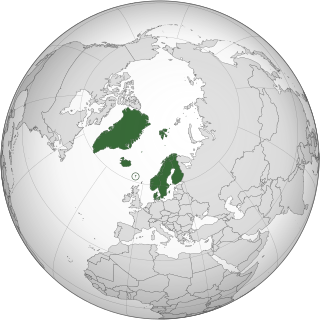
The Nordic countries are a geographical and cultural region in Northern Europe and the North Atlantic. It includes the sovereign states of Denmark, Finland, Iceland, Norway and Sweden; the autonomous territories of the Faroe Islands and Greenland; and the autonomous region of Åland.
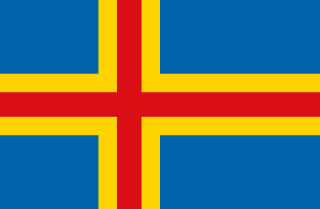
Åland has been an autonomous and demilitarised region of Finland since a 1920 decision of the League of Nations. It is the smallest region of Finland by both area (1,580 km2) and population (30,129), constituting 0.51% of Finland's land area and 0.54% of its population. Its only official language is Swedish and the capital city is Mariehamn.
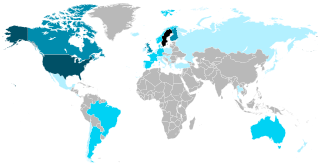
Swedes are an ethnic group native to the Nordic region, primarily their nation state of Sweden, who share a common ancestry, culture, history and language. They mostly inhabit Sweden and the other Nordic countries, in particular Finland where they are an officially recognized minority, with a substantial diaspora in other countries, especially the United States.

Sweden and the North Atlantic Treaty Organization (NATO) have a close relationship and regularly carry out joint exercises, cooperate in peacekeeping operations, and share information. Sweden is one of five members of the European Union that are not members of NATO. Sweden joined the Partnership for Peace on 9 May 1994.


















